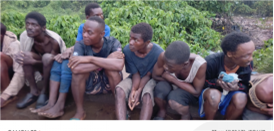On September 11, 2025, the Liberia Drug Enforcement Agency (LDEA) launched a significant operation targeting a notorious drug haven within a mangrove swamp along the 72nd Boulevard Road in Paynesville, Liberia. This area had become a refuge for over 200 drug users, who sought shelter amidst the challenging terrain of the swamp, utilizing the dense foliage and waterways as cover for their illicit activities. The operation, spearheaded by LDEA’s Deputy Officer-in-Charge for Operations, Patrick Kamasu, resulted in the apprehension of 18 individuals engaged in drug use, while several others managed to evade capture by retreating deeper into the swamp’s intricate network of waterways and hidden pathways.
The raid, part of a broader strategy to combat drug trafficking and reclaim communities from the grip of substance abuse, signifies the LDEA’s commitment to address the escalating drug crisis within Liberia. Kamasu emphasized that the primary focus of their efforts is on apprehending the traffickers who supply these illicit substances, viewing them as the root cause of the widespread addiction plaguing the nation. He assured the public that these operations would continue across Monrovia, targeting various communities and known drug hubs, with the ultimate aim of making Liberia a drug-free nation. The undisclosed nature of future raids reflects the LDEA’s tactical approach to disrupting trafficking networks and maintaining an element of surprise.
The LDEA acknowledges the severe impact of the influx of narcotics into Liberian communities, particularly among youth, which has fueled a significant increase in addiction. They have outlined a multi-pronged approach to tackling this issue, incorporating intensified raids, enhanced surveillance measures, and community outreach programs to address both the supply and demand dynamics of the drug crisis. This comprehensive strategy aims to not only disrupt the flow of drugs but also to raise awareness and foster community involvement in combating the spread of illicit substances.
The operation at the 72nd Boulevard mangrove swamp uncovered a cache of drugs, including Sparking Kush, heroin, Tramadol, and cocaine, highlighting the presence of a diverse range of illicit substances within the community. The LDEA also dismantled the makeshift hideouts used by drug users, demonstrating their commitment to disrupting the physical infrastructure that facilitates these activities. Simultaneously, LDEA officers on the ground appealed for increased budgetary support and logistical resources, emphasizing the need for adequate equipment and resources to effectively penetrate hard-to-reach drug hideouts and apprehend traffickers. They highlighted the inherent dangers involved in such operations, particularly in challenging terrains like the mangrove swamp, where they often face resistance and potential threats.
The arrested drug users, meanwhile, voiced their plea for the government to establish rehabilitation centers as a crucial component of the nation’s drug control strategy. They emphasized the cyclical nature of their predicament, where they are repeatedly cleared out of their makeshift shelters only to return shortly after due to a lack of alternative options. This underscores the need for comprehensive support systems that address not only the immediate issue of drug use but also the underlying social and economic factors that contribute to it. Their abandonment by families further highlights the need for reintegration programs and social support networks to facilitate their recovery and re-entry into society.
The raid on the 72nd Boulevard mangrove swamp underscores the complex challenges facing Liberia in its fight against drug trafficking and addiction. It highlights the need for a multi-faceted approach that combines law enforcement operations, community engagement, and social support programs to effectively address both the supply and demand aspects of the drug crisis. The LDEA’s commitment to these efforts, coupled with the appeals from both law enforcement officers and drug users themselves, underscores the urgency of the situation and the need for collective action to create a drug-free Liberia. The incident also brings to light the critical role of rehabilitation and reintegration programs in breaking the cycle of addiction and providing individuals with the necessary support to rebuild their lives.














